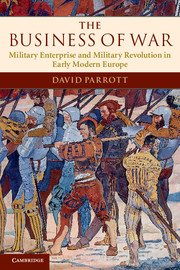Book contents
- Frontmatter
- Contents
- Figures
- Maps
- Acknowledgements
- Abbreviations
- Currencies
- Introduction
- Part I Foundations and expansion
- 1 Military resources for hire, 1450–1560
- 2 The expansion of military enterprise, 1560–1620
- 3 Diversity and adaptation: military enterprise during the Thirty Years War
- Part II Operations and structures
- Notes
- Bibliography
- Index
3 - Diversity and adaptation: military enterprise during the Thirty Years War
Published online by Cambridge University Press: 05 January 2015
- Frontmatter
- Contents
- Figures
- Maps
- Acknowledgements
- Abbreviations
- Currencies
- Introduction
- Part I Foundations and expansion
- 1 Military resources for hire, 1450–1560
- 2 The expansion of military enterprise, 1560–1620
- 3 Diversity and adaptation: military enterprise during the Thirty Years War
- Part II Operations and structures
- Notes
- Bibliography
- Index
Summary
The previous chapter illustrated how the shift by European states towards reliance on mechanisms of military enterprise was an evolutionary process, shaped by a variety of pressures and problem-solving needs from the early sixteenth century onwards. Whether military enterprise would subsequently have expanded and flourished so extensively without the particular factor of the Thirty Years War is a matter for speculation; hard-pressed governments had certainly discovered before 1619 that the contracting-out of military functions and the mobilizing of subjects’ resources which it permitted offered a practical solution to some of the constraints on mobilizing military force. Yet the Thirty Years War, through its unprecedented length, geographical scale and number of belligerents, offered a vital forcing-house for the development of military enterprise. At one level this has been noted by historians: the war is strongly identified with the hiring and use of mercenaries, whose self-serving and strategically sterile military activities are considered in part responsible for the brutality, destructiveness and length of the struggle. The career of the Imperial Generalissimo Albrecht Wallenstein, the greatest of all condottiere, whose absolute authority over an army of more than 100,000 men raised and maintained through his own networks and resources, is offered as the epitome of an age of military enterprise. Whether seen as an extraordinary project launched by an organizer and administrator of precocious talent, or the last gasp of a system of warfare dominated by over-powerful and unreliable aristocratic power-broking, Wallenstein’s army is placed at the apex of a process by which a long-running form of military enterprise finally reaches its high-water mark in the context of Imperial politics in the 1620s. After Wallenstein the military world changes: fighting wars through private enterprise is everywhere acknowledged as dangerous and unviable, even if many states were unable to act upon that recognition until after the end of the Thirty Years War.
- Type
- Chapter
- Information
- The Business of WarMilitary Enterprise and Military Revolution in Early Modern Europe, pp. 101 - 136Publisher: Cambridge University PressPrint publication year: 2012



